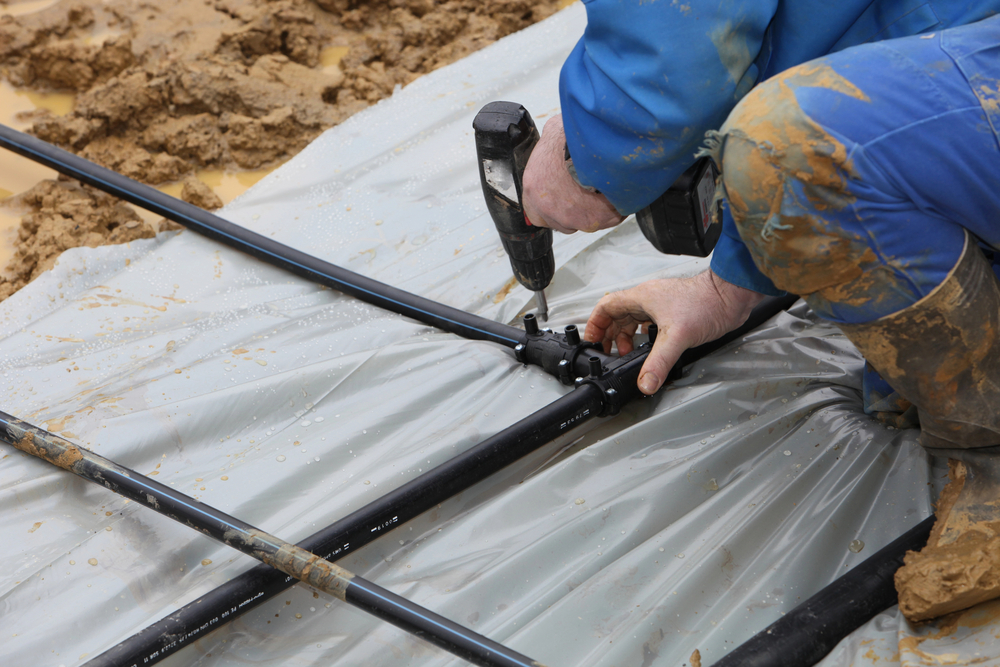Geothermal Heat Pump Sizing & Installation
Here, you’ve discovered an excellent resource for installing and repairing geothermal heat pumps!
First, let us ask you a few questions to get started:
- Is it time for you to replace your outdated gas boiler?
- Do your radiant heated floors or panels need a new heat source?
- Have you been considering the benefits of a very effective geothermal heat pump?
- Do you want maximum comfort, silent operation, and the lowest possible power bill?
- Are you thinking about going all-electric instead of gas for heating?
Meridian Home Services is a small mechanical firm in Grove, OK, run by a veteran who specializes in advanced heat pump technology. We provide high-quality services for installing, replacing, and upgrading geothermal heat pumps. Our staff has the expertise, technical skills, and practical experience to precisely measure, expertly install, accurately repair, and skillfully maintain various types and brands of geothermal heat pumps. Contact our solutions adviser now to explore geothermal heat pump options and heating and cooling load information.
Meridian Home Services Delivers World-class Geothermal Heat Pump Systems:
- Geothermal heat pump preventive maintenance
- Geothermal heat pump safety inspections
- Hydronic air-handler installation and replacements
- Water-to-air ground-source heat pump installation and replacements
- Water-to-water ground-source heat pump installation and replacements
- Ground-source heat pump flow center installation and upgrades
- Geothermal earth loop installation and replacements
- Direct exchange ground-source heat pump installation and replacements
- Combination ground-source heat pump installation and replacements

Installation, Repair, or Upgrade Provides these Advantages:
- Environmentally safer thanks to a factory-sealed refrigeration circuit and zero emissions
- Heat pump technologies are essential to renewable energy and electrification initiatives in the United States.
- Compatible with radiators and chilled ceilings (water-to-water devices with sophisticated controls)
- Nearly all hot water is produced at no cost, which significantly reduces household energy use by an extra 10-15%.
- Get special winter pricing and lower power costs (available from most electric providers)
- The cost of installation is equivalent to that of a high-efficiency comfort system, with the current federal tax credit of 30%Because ground temperatures remain steady, the system’s energy costs are often constant.
- Versatile application: suitable for area heating, hot water generation, and air conditioning
- Multiple unit combinations (water-to-water, water-to-air, and direct exchange split) provide design flexibility.
- Accelerate loan payback by allocating electricity savings to mortgage principal installments.
- Extremely low running costs due to an Energy Efficiency Ratio (EER) that is up to three times greater than the statutory minimum
- Because of the insulated cabinets and ECM fans, the operation is very quiet (as low as 51 dB).
Effective Energy Efficiency – Geothermal Heat Pumps
These days, one of the most effective and energy-saving heating and cooling systems on the market is the ground-source heat pump system (GSHP). Using the constant temperatures found in the earth’s crust, a geothermal heat pump may offer hot water all year round, as well as heating in the winter and cooling in the summer. In contrast to conventional HVAC systems, which produce heat by burning fossil fuels or using electricity, ground source heat pumping (GSHP) systems transfer heat from the earth into buildings and residences in the winter and back again in the summer. GSHPs are very efficient because of this heat transfer rather than heat creation.
The US Department of Energy (DOE) claims that ground source heat pumps (GSHPs) are a very effective renewable energy source that is gaining traction for use in both residential and commercial settings. This is because the heat pump can function more easily underground due to the far more stable temperatures there than above. When compared to traditional systems, GSHPs may lower energy usage over a year, which can result in considerable cost savings on utility bills. According to the DOE, ground-source heat pumps (GSHPs) use less power and less energy than air-source heat pumps (ASHPs) and conventional air conditioners or electric air handlers.
Additionally, the DOE acknowledges that GSHPs have positive environmental effects. Compared to traditional HVAC systems, a geothermal heat pump produces far less carbon emissions since it draws renewable heat from the earth. Furthermore, geothermal heat pumps are now the most ecologically friendly option for heating, cooling, and hot water since they produce the fewest emissions when compared to other domestic heating sources, according to a study published in Applied Energy. The DOE also points out that since ground-source heat pumps (GSHPs) rely on the omnipresent heat stored in the ground rather than on sunshine or wind, they are a feasible technology for the whole country. The Environmental Protection Agency (EPA) of the United States finds that ground-source heat pumps are a reasonably priced heating and cooling technology. As a result, they play a crucial role in the nation’s plan to cut carbon emissions and fight climate change.
